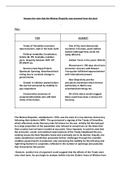Assess the view that the Weimar Republic was doomed from the start
Plan:
FOR AGAINST
· Treaty of Versailles economic · One of the most democratic
repercussions, stab in the back myth countries in Europe, good welfare
system (although they could not
· Political instability Constitution, really afford it)
Article 48, PR, Unstable coalition
govs, disparity between SDP, KP, · Golden Years in the years 1924-9à
ZP,DNVP etc
· Stresemann’s 100 days short term
· Social unrest Kapp Putsch, economic recovery with Dawes+
Spartacist Uprising, disenfranchised Young plan fulfilment/rapprochement
voting due to constant change in with international powers
governments.
· New Objectivity and the
· Growth in inflation started before art/culture movement which thrived
the war but worsened by inability to particularly in Berlin new
pay reparations scientists/technology etc.
· Conservative presence of · All of the above would suggest
Junkers/nationalists who still held there could have been a chance for
views of the Kaiser. recovery.
·
The Weimar Republic, established in 1918, was the start of a new German democracy
following their defeat in WW1. The government’s signing of the Treaty of Versailles,
which effectively made Germany take full blame for the war, initially felt like betrayal
to a large proportion of the population who refused to accept loss on the basis that
their country had not been invaded at any point. Once imposed, it could be said that
the economic, social, and political repercussions of the Treaty heightened the pre-
existing issues the New Republic faced and eventually led to its demise. Equally, the
newly established constitution presented further challenges through the unstable
coalition government's it produced, only worsening the inability for the left wing and
right-wing factions to cooperate, reflected in the number of uprisings and putsches
that characterise this period.
However, another line of argument could suggest that the effects of the Treaty were
only short term. As you begin to analyse further into the Golden Years of Weimar from





